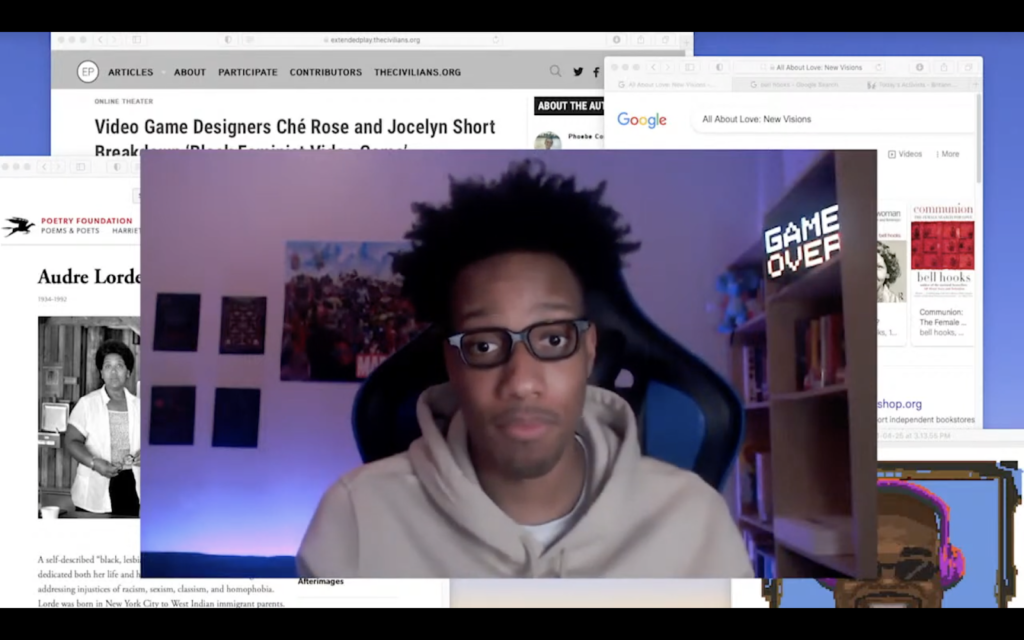 Presented by The Civilians
Presented by The Civilians
Written by Darrel Alejandro Holnes
Directed by Victoria Collado
Video Game created by Ché Lovell Rose & Jocelyn Short
Produced by Ilana Becker
Sound Design by Twi McCallum
Featuring Christon Andell, Kyla Jeanne Butts, Starr Kirkland, Darrel Alejandro Holnes, Constance Fields, Phillip Patrick Wright, Michael Diamond, Mia Anderson, and Brandiss LaShai Seward.
April 27 – May 9, 2021
The Civilians
138 SOUTH OXFORD STREET #3C
BROOKLYN, NEW YORK 11217
The Civilians on Facebook
Critique by Afrikah Smith
YOUTUBE — BLACK FEMINIST VIDEO GAME is a groundbreaking, online theatrical experience that explores love, neurodiversity, and the importance of Black feminism.
After a first date gone wrong, Jonas Jones (Christon Andell) is determined to find a way to win back his crush, Nicole (Starr Kirkland). As a biracial teenager with autism, Jonas broadcasts his life online as a means of connection, destigmatising autism, and becoming a filmmaker. Integrating live chat in the performance, Jonas asks audiences for advice on what he should do. While brainstorming, he finds an old gift from his mother; a video game that may lead a way to winning Nicole back.
With the help of his friend Sabine (Kyla Jeanne Butts) to guide him, they begin their quest on BLACK FEMINIST VIDEO GAME; only to be confronted by biases and misconceptions of women in his life.
Giving a perspective into love, race, and neurodiversity, Darrel Alejandro Holnes creates a first-person view play that allows audiences to interact and influence the outcome of the play through live chat. Opening dialogue, BLACK FEMINIST VIDEO GAME asks audiences how to be better allies and challenges our own views and biases around neurodiversity and Black feminism. Especially during the rise of Black Lives Matter, BLACK FEMINIST VIDEO GAME gives representation to Black neurodivergent people, who are often left unseen in conversations around neurodiversity and race, and are affected by police brutality.
Teetering between enjoying the play and having second thoughts, my main concern while watching the play was this feeling of disconnect during the performance. After a year of virtual theatre, it was hard to tell if the disconnection was due to the performance itself or because it was over the internet.
Although not intentional, I felt as though the element of audience members having the ability to influence some of Jonas’s choices made me feel as though I was not giving Jonas the autonomy of making his own choices. I wondered what would happen if Jonas disagreed with a choice. Would he still have gone with it, against it, or be subject to audiences’ questioning his ability to make choices? Acknowledging that there is limited representation of Black neurodivergent people, how do we navigate creating a clear BIPOC representation of neurodivergent spectrum in virtual theatre?
In addition to understanding that a focused aspect of the performance was the video game, I felt as though I wasn’t really seeing Jonas. There was something off that I cannot yet name. As frustrating as it is to not be able to name it, it pushes me further to ask: what are audiences taking away from the performance?
BLACK FEMINIST VIDEO GAME greatly portrayed Jonas’s relationship to his mother and Sabine as people who see Jonas for who he is while holding him accountable for his biases, actions, and choices. This was important to note in representation, and I appreciate the care that The Civilians put into this play in consulting with a neurodiversity consultant (Cortland Nesley).
An integration of live performance, video game design, and live chat, BLACK FEMINIST VIDEO GAME is the first of its kind. Using virtual platforms in the digital age, could this be a glimpse into the future of theatre?
Available on-demand, BLACK FEMINIST VIDEO GAME runs May 3rd through May 9th, before making its premiere at the Oregon Shakespeare Festival May 11-23. More information can be found at Black Feminist Video Game – O!.
